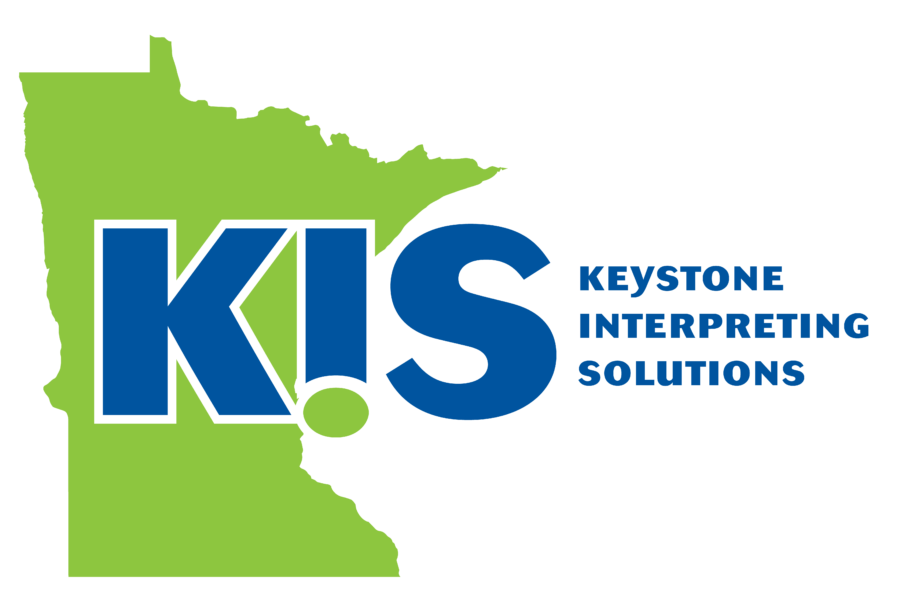Interpreting Services
We create connections.

Interpreting is the heart of what we do and who we are at KIS Interpreting. With decades of experience in the industry and top-notch talent, you can trust us to facilitate communication.
Interpreting Services
ASL Interpreters
American Sign Language (ASL) interpreters provide English-to-ASL interpretation for clients, and are the majority of our service requests.
Certified Deaf Interpreters
Certified Deaf Interpreters (CDI) are trained and certified Deaf people who possess native knowledge of American Sign Language (ASL).
Deaf Blind Interpreters
DeafBlind interpreters are trained in Pro-Tactile, which incorporates tactile American Sign Language in their interpreting work.
Spoken Language Interpreters
Spoken language interpreters work with non-English speaking clients who speak a different language by providing them with translations from their spoken language to English, or vice versa.
VRI Interpreting
KIS provides a pre-scheduled service delivery system that enables all businesses looking for easy access to high quality interpreting services through video technology on portable computer devices anywhere, anytime.
Our Settings
Healthcare
More About Medical Interpreting
In medical settings, without qualified interpreting services, the Deaf and hard of hearing patient, family member(s) or companion(s) may not easily comprehend discussions of diagnosis and treatment, the meaning of medical terminology, warnings and guidelines, and prescription instructions. The basic need to comprehend, make decisions and participate is not fulfilled. In addition, the provider and medical staff run the risk of misunderstanding the patient’s symptoms, misdiagnosing the condition, and prescribing the wrong or even harmful treatment.
Title III of the Americans with Disabilities Act (https://www.ada.gov/ada_title_III.htm) mandates that all private health care providers, regardless of the clinic/office size or the number of employees follow the requirements of ADA and provide a qualified sign language interpreter.
KIS interpreters working in health care settings are expected to interpret complex medical terminology. To work in health care settings, an interpreter must have the following certificates and training:
- Current RID certification
- Trained in Mental Health Interpreter Training (MHIT)
- Trained to be fully compliant with confidential clauses
- Adhering to the NAD-RID Code of Professional Conduct
- Following Health Insurance Portability and Accountability Act (HIPAA)
- Adhering to Patient Health Information laws/policies
- Abiding by specific sections of Health Information Technology for Economic and Clinical Health (HITECH) Act
- Complying with Family Educational Rights and Privacy Act (FERPA)
KIS provides Certified Deaf Interpreters (CDI) for those situations where it is necessary to have both an ASL interpreter and a CDI interpreter. KIS interpreters are trained to understand that their moral, ethical, and productive decisions in interpreting have an impact on the quality of your access.
Legal
More About Legal Interpreting
KIS has a pool of certified legal interpreters, a group of highly trained specialists who possess knowledge of legal terminology both in English and ASL for legal situations and in the courtroom. They work with the court system to provide clear and accurate translation in both languages. Legal interpreters are trained to ensure the rights of due process and participation in the court system for all those involved and more importantly, to place a non-English speaking consumer, as closely as linguistically possible, in the same situation as a English speaker in a legal situation. All KIS legal interpreters are specially certified and rostered to work within the court system.
Education
More About Academic interpreting
Facilitating communication between Deaf/HH students, faculty, staff, other students, and academic service providers is the goal of the educational interpreter. Because post-secondary institutions receive federal financial assistance, they are required under Section 504 of the Rehabilitation Act of 1973 to be accessible to students and other individuals with disabilities. All KIS interpreters are required to adhere to their state’s laws governing interpreting in educational settings and the appropriate code of professional conduct governing ethical behavior within the profession. KIS provides qualified interpreters that are appropriately skilled and matched to provide the best communication access for all involved—students, staff and faculty. Our goal is to ensure every individual is provided equal communication footing in the educational setting.
